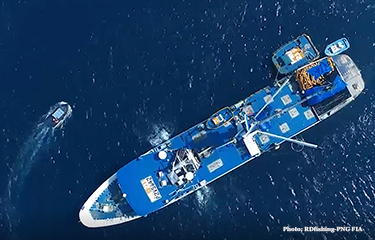The Global Sustainable Seafood Initiative (GSSI) has seen its ranks grow in 2021, with the Papua New Guinea Fishing Industry Association (PNG FIA) recently coming aboard as a funding partner and the United Nations Industrial Development Organization (UNIDO) joining as an affiliated partner.
PNG FIA, which provides “a united voice for the fishing and associated industries in Papua New Guinea,” has been forging stakeholder partnerships on the basis of sustainability for years, according to FIA Director of Sustainability Marcelo Hidalgo.
"Our partnership and stakeholder engagement started in August 2018, when FIA signed and cooperation agreement (MoU) with the National Fishery Authority (NFA) of PNG to support the Marine Stewardship Council (MSC) fishery certification of the PNG waters,” Hidalgo said in a statement shared with SeafoodSource.
Its partnership with GSSI, which was announced on 23 February, is the natural progression of this work for PNG FIA, Hidalgo said.
“Moving ahead with partnerships, we are glad to engage a sustainability leader in the seafood business, increasing our network and also building our commitment to finding solutions to the current challenges of the tuna industry; Since January (February) 2021 we became members of the Global Sustainable Seafood Initiative (GSSI),” Hidalgo said.
PNG FIA President and Chairman Sylvester Pokajam said his nonprofit’s GSSI funding partner status further reinforces its commitment to ocean conservation, worker and crew welfare, ghost gear management, and more.
“The partnership with GSSI is a milestone for us to improve and increase our commitment to the conservation of the ocean ecosystem as well as protect people working in the fishery with holistic approach included in the FIA (PNG) responsible sourcing policy, which includes the marine litter and fishing gear (ghost gear) management practices and labor onboard improvement (crew welfare, improving working conditions of the crew on board fishing vessels). This partnership is also a great opportunity to collaborate with global stakeholders to ensure sustainability, transparency, and traceability in the seafood supply chain," Pokajam said.
PNG FIA members include a large commercial tuna fishing fleet based in Papua New Guinea, tuna processing canneries, as well as small- to mid-sized enterprises involved in fisheries for prawn, beche-de-mer, mud crab, lobster, freshwater, and reef finfish. In May 2020, PNG’s purse-seine skipjack and yellowfin tuna fishery achieved MSC certification.
UNIDO has also established new ties in 2021 with GSSI, a public-private partnership on seafood sustainability with more than 90 seafood stakeholders across the industry. UNIDO’s GSSI affiliated partnership has been forged “to help strengthen joint efforts to promote sustainable production and consumption in seafood industry,” the organizations said in a joint press release.
The seafood industry currently supports the livelihoods of 13 percent of the world’s population, according to UNIDO.
“As seafood production increases to meet rising global demand, so have concerns over the environmental, economic, and social impact of production worldwide,” it said.
By partnering with GSSI, UNIDO is looking to secure better livelihoods for seafood producing communities while conserving the environment within which they operate, it said.
“UNIDO very much values the cooperation with GSSI and the Food and Agriculture Organization in this innovative approach to promote sustainable fisheries development, and to increase its long-term contribution to securing better livelihoods in producer communities and to protecting the natural environment,” UNIDO Digitalization, Technology, and Agri-Business Directorate (DTA) Managing Director Bernardo Calzadilla said.
UNIDO, a specialized agency of the United Nations with 170 member states, has long been dedicated to establishing trade-related capacities through a three-pillar approach. These pillars include “enhancing the capacity of producers, processors and entire value chains to comply with technical and sustainability standards and market requirements; strengthening national quality infrastructure (NQI) and its services, in particular for testing and certification; and fostering a culture of quality,” UNIDO said.
Photo courtesy of PNG FIA







